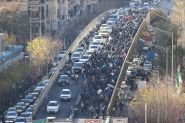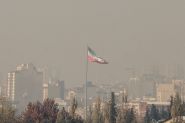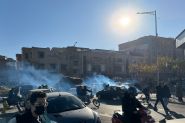- Home
- Middle East
- Tehran Fights for Its Political Survival in Iraq
Iraq’s parliamentary elections on November 11 take place amid widespread voter apathy but intense regional tension. For a weakened Iran, the stakes are existential: retain its grip on Baghdad or risk losing one of its last footholds in the Arab world.
Officially, the elections are hailed as a step forward for a country still scarred by two decades of war and instability. In reality, the vote unfolds under the persistent shadow of Iran, determined to preserve a political system it has largely shaped since Saddam Hussein’s fall in 2003.
Outgoing Prime Minister Mohammad Shia al-Sudani owes his rise to the Coordination Framework, a coalition of Shia parties and militias aligned with Tehran. Their backing secured his position in 2022, and today, these same factions are working to extend their dominance as public opposition to Iranian interference grows louder.
Iranian Influence Wavers
These elections come at a critical juncture for the Islamic Republic. Its regional allies, including the Lebanese Hezbollah, Palestinian Hamas, and Yemen’s Houthis, have been severely weakened by Israeli offensives. The fall of Bashar al-Assad’s Syrian regime at the end of 2024 delivered a final blow to the “Shia Crescent” Tehran had sought to consolidate from Beirut to Baghdad.
In this context, Iraq stands as the Iranian regime’s last lifeline for maintaining strategic depth and vital economic access. Pro-Iranian militias remain powerful, heavily armed, and deeply embedded within the country’s security and economic institutions. However, their legitimacy is crumbling. Exhausted by corruption and sectarian violence, the Iraqi population is increasingly vocal in rejecting foreign control, whether from Tehran or elsewhere.
The Absence of the Sadr Movement Marks a Turning Point
The boycott of the elections by Shia leader Moqtada Sadr, a resolute nationalist and fierce opponent of Iranian influence, strikes a serious blow to the credibility of the electoral process. In 2021, his movement won a majority of seats before being sidelined by the pro-Iranian coalition. His voluntary withdrawal underscores how political power has been monopolized by forces loyal to Tehran.
“This election is nothing more than a sham for Iran’s benefit,” says an analyst in Baghdad. The low voter turnout expected, likely below 40%, reflects a population convinced that the ballots will change little as long as key decisions are made in Qom rather than Baghdad.
Washington Returns to Iraq
Confronted with the persistent presence of Iranian networks, the United States has moved to reassert its influence in Iraq’s political arena. Special envoy Mark Savaya, of Iraqi origin, reaffirmed Washington’s commitment to “liberate Iraq from malicious foreign interference,” directly targeting Tehran and its proxies. The 2,500 American troops still stationed in the country now serve as a safeguard against Iranian dominance, while strategic economic contracts, particularly in the energy sector, reinforce the US foothold.
Observers say Washington expects the incoming government to take tangible measures to curb Iranian influence, including disarming militias and preventing Iran from using Iraqi territory to bypass international sanctions.
A Country Held Hostage
Twenty years after Saddam Hussein’s fall, Iraq remains a battleground for foreign powers. The November 11 vote will determine whether Baghdad remains a pawn of a faltering theocratic regime or begins to reclaim control over its national destiny.
The stakes are immense: rebuilding a sovereign state free from militias, corruption, and foreign influence. All signs suggest that Iran will do everything in its power to prevent this outcome. For Tehran, losing Iraq would mean far more than the loss of an ally; it would signal the collapse of an empire of influence built on fear and dependency.
Read more




Comments